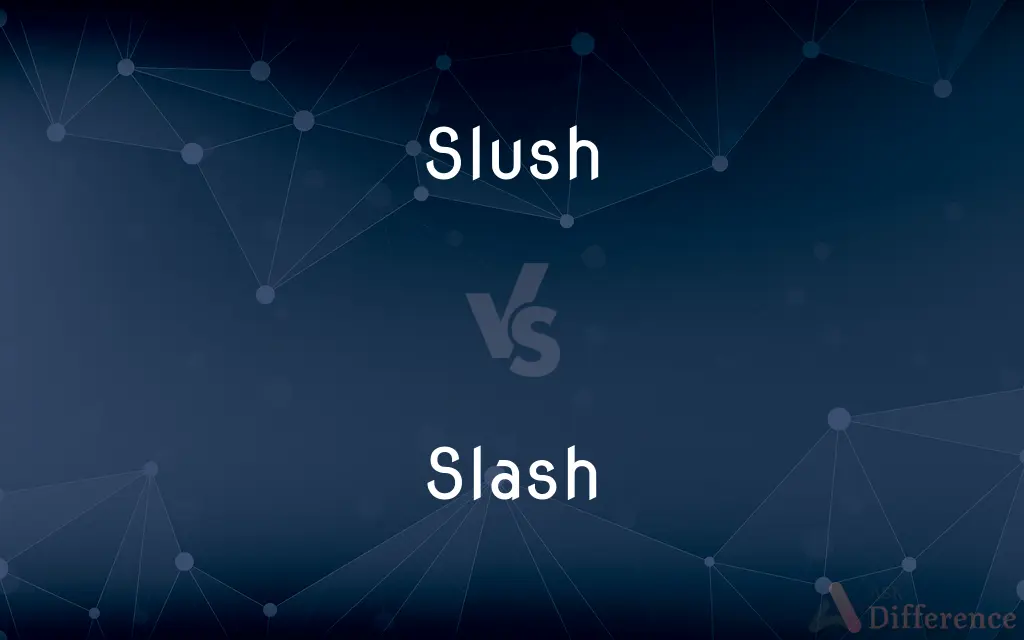Slush vs. Slash — What's the Difference?
By Tayyaba Rehman & Urooj Arif — Updated on March 29, 2024
Slush is semi-frozen water or muddy snow, often slippery underfoot, whereas slash is a cutting motion or mark made by such a motion, often used in text as a punctuation mark (/).

Difference Between Slush and Slash
Table of Contents
ADVERTISEMENT
Key Differences
Slush refers to a specific state of water or snow, characterized by its semi-frozen, slushy consistency that makes it neither solid ice nor liquid water. It's common in late winter and early spring when snow begins to melt. On the other hand, slash is associated with cutting or dividing. In writing and digital communication, a slash is used as punctuation to denote alternatives (e.g., and/or), fractions (1/2), or to separate elements, such as dates (12/31/2023).
While slush often presents a challenge for pedestrians and drivers due to its slippery nature and potential to refreeze into ice, slash, in the context of writing, serves a functional role in clarifying textual content. It can also refer to the action of making a long cut or tear, highlighting its dual nature as both a noun and a verb.
In terms of environmental impact, slush can contribute to hazardous conditions, leading to accidents and requiring significant cleanup efforts. Conversely, the concept of slash has been adopted in various fields, such as slash-and-burn agriculture, which has a considerable environmental impact due to deforestation and habitat destruction.
Culturally, slush is often associated with the changing seasons, symbolizing the transition from winter to spring. It can evoke a sense of renewal or messiness, depending on one's perspective. Meanwhile, the slash has carved out a niche in digital and literary cultures, especially in fanfiction, where it denotes a genre of romantic or erotic fiction involving characters of the same sex.
In the digital realm, slush is seldom relevant except in discussions about weather conditions or as a metaphor for murky or unclear situations. The slash, however, is ubiquitous in URLs, coding, and online communication, underscoring its importance in the structure and navigation of digital content.
ADVERTISEMENT
Comparison Chart
Definition
Semi-frozen water or muddy snow.
A cutting motion/mark or punctuation mark (/).
Physical State
Semi-solid, slushy.
Abstract (action) or concrete (mark).
Usage Context
Environmental, seasonal.
Writing, digital communication, agriculture.
Cultural Symbol
Transition between seasons, messiness.
Division, choice, digital navigation.
Functionality
Creates hazardous conditions.
Clarifies text, represents alternatives.
Compare with Definitions
Slush
Semi-frozen snow.
The streets were covered in slush after the snowstorm.
Slash
Punctuation mark (/).
Use a slash to separate items in a list.
Slush
Slippery underfoot.
Be careful on the sidewalk; it's full of slush.
Slash
Cutting motion.
The swordsman's slash was swift and precise.
Slush
Muddy snow mixture.
Walking through the slush made her boots dirty.
Slash
Division or separation.
The document was filled with dates written with slashes.
Slush
Seasonal phenomenon.
Slush on the roads is a clear sign of early spring.
Slash
In writing, denotes alternatives.
Please mark your answer with a 'yes/no' slash.
Slush
Hazardous driving condition.
Driving was difficult due to the slush on the highway.
Slash
In fanfiction, denotes a genre.
She enjoys reading slash fiction featuring her favorite characters.
Slush
Slush, also called slush ice, is a slurry mixture of small ice crystals (e.g., snow) and liquid water.In the natural environment, slush forms when ice or snow melts. This often mixes with dirt and other materials, resulting in a gray or muddy brown color.
Slash
The slash mark: the punctuation mark ⟨/⟩, sometimes inclusive of any mark produced by a similar slashing movement of the pen, as the backslash ⟨\⟩.
Slush
Partially melted snow or ice
The snow was turning into brown slush in the gutters
Slash
To cut or form by cutting with forceful sweeping strokes
Slash a path through the underbrush.
Slush
Excessive sentiment
The slush of Hollywood's romantic fifties films
Slash
To make a gash or gashes in.
Slush
Make a squelching or splashing sound
There was water slushing around in the galley
Slash
To cut a slit or slits in, especially so as to reveal an underlying color
Slash a sleeve.
Slush
Partially melted snow or ice.
Slash
(Sports) To swing a stick at (an opponent) in ice hockey or lacrosse, in violation of the rules.
Slush
Soft mud; slop; mire.
Slash
To criticize sharply
The reviewers slashed the composer's work.
Slush
(Nautical) Grease or fat discarded from a ship's galley.
Slash
(Sports) To hit or propel (a ball, for instance) forcefully in a straight line.
Slush
A greasy compound used as a lubricant for machinery.
Slash
To reduce or curtail drastically
Slash prices for a clearance sale.
Slush
Maudlin speech or writing; sentimental drivel.
Slash
To make forceful sweeping strokes with a sharp instrument.
Slush
A drink made of flavored syrup poured over crushed ice.
Slash
To cut one's way with such strokes
We slashed through the dense jungle.
Slush
(Informal) Unsolicited manuscripts submitted to a publisher.
Slash
To make drastic reductions in something
Slashing away at the budget.
Slush
To daub (machinery) with slush.
Slash
A forceful sweeping stroke that is made with a sharp instrument.
Slush
To fill (joints in masonry) with mortar.
Slash
A long cut or other opening made by such a stroke; a gash or slit.
Slush
(Nautical) To wash down (a deck) by splashing with water.
Slash
A decorative slit in a fabric or garment.
Slush
To splash or soak with slush or mud.
Slash
A diagonal mark ( / ) that is used especially to separate alternatives, as in and/or, to represent the word per, as in miles/hour, to separate component parts of a URL, as in whitehouse.gov/kids/patriotism/, and to indicate the ends of verse lines printed continuously, as in Old King Cole / Was a merry old soul. Also called virgule.
Slush
To walk or proceed through slush.
Slash
Branches and other residue left on a forest floor after the cutting of timber.
Slush
To make a splashing or slushy sound.
Slash
Often slashes Wet or swampy ground overgrown with bushes and trees.
Slush
Half-melted snow or ice, generally located on the ground.
As the skiing season drew to an end, there was nothing but slush left on the piste.
Slash
A genre of fanfic depicting romantic relationships between characters, usually of the same sex, that are not romantically connected in the original work or works upon which the fanfic is based.
Slush
Liquid mud or mire.
Slash
As well as; and. Used as a representation of the virgule (as in restaurant/art gallery or actor/director), often styled with hyphens in print
A restaurant slash art gallery.
An actor-slash-director.
Slush
Flavored shaved ice served as a drink.
Slash
A slashing action or motion, particularly:
Slush
A soft mixture of grease and other materials, used for lubrication.
Slash
A swift, broad, cutting stroke made by an edged weapon or whip.
A slash of his blade just missed my ear.
Slush
The refuse grease and fat collected in cooking, especially on shipboard.
Slash
(cricket) A wild swinging strike of the bat.
Slush
(engineering) A mixture of white lead and lime, used as a paint to prevent oxidation.
Slash
A hard swift lateral strike with a hockey or lacrosse stick, usually across another player's arms or legs.
Slush
(publishing) Unsolicited manuscripts, as in slush pile.
Slash
Any similar wide striking motion.
He took a wild slash at the ball but the captain saved the team's skin by hacking it clear and setting up the team for a strike on the goal.
Slush
To smear with slushy liquid or grease.
Slash
(figuratively) A sharp reduction.
After the war ended, the army saw a 50% slash in their operating budget.
Slush
To slosh or splash; to move as, or through, a slushy or liquid substance.
Slash
A mark made by a slashing motion, particularly:
Slush
To paint with a mixture of white lead and lime.
Slash
A cut or laceration, often deep, made by an edged weapon or whip.
He was bleeding from a slash across his cheek.
Slush
Soft mud.
Slash
(botany) A deep taper-pointed incision in a plant.
Slush
A mixture of snow and water; half-melted snow.
Slash
Something resembling such a mark, particularly:
Slush
A soft mixture of grease and other materials, used for lubrication.
Slash
(fashion) A slit in an outer garment exposing a lining or inner garment, usually of a contrasting color or design; any intentional long vertical cut in a garment. Clearing
Slush
The refuse grease and fat collected in cooking, especially on shipboard.
Slash
A clearing in a forest, (particularly) those made by logging, fire, or other violent action.
Slush
A mixture of white lead and lime, with which the bright parts of machines, such as the connecting rods of steamboats, are painted to be preserved from oxidation.
Slash
Female genitalia.
Slush
To smear with slush or grease; as, to slush a mast.
Slash
The loose woody debris remaining from a slash, the trimmings left while preparing felled trees for removal.
Slash generated during logging may constitute a fire hazard.
Slush
To paint with a mixture of white lead and lime.
Slash
(fandom slang) Slash fiction.
Slush
Partially melted snow
Slash
A drink of something; a draft.
Slush
Make a splashing sound;
Water was splashing on the floor
Slash
A piss: an act of urination.
Where's the gents? I need to take a slash.
Slush
Spill or splash copiously or clumsily;
Slosh paint all over the walls
Slash
(US) A swampy area; a swamp.
Slash
(Scotland) A large quantity of watery food such as broth.
Slash
(UK) slatch: a deep trough of finely-fractured culm or a circular or elliptical pocket of coal.
Slash
To cut or attempt to cut, particularly:
Slash
To cut with a swift broad stroke of an edged weapon.
They slashed at him with their swords, but only managed to nick one of his fingers.
She hacked and slashed her way across the jungle.
Slash
To produce a similar wound with a savage strike of a whip.
Slash
(ice hockey) To strike swiftly and laterally with a hockey stick, usually across another player's arms or legs.
Slash
(figuratively) To reduce sharply.
Competition forced them to slash prices.
Profits are only up right now because they slashed overhead, but employee morale and product quality have collapsed too.
Slash
(fashion) To create slashes in a garment.
Slash
(figuratively) To criticize cuttingly.
Slash
To strike violently and randomly, particularly:
Slash
(cricket) To swing wildly at the ball.
Slash
To move quickly and violently.
Slash
To crack a whip with a slashing motion.
Slash
To clear land, with violent action such as logging or brushfires or through grazing.
The province's traditional slash-and-burn agriculture was only sustainable with a much smaller population.
Slash
To write slash fiction.
Slash
To piss, to urinate.
Slash
To work in wet conditions.
Slash
Used to note the sound or action of a slash.
Slash
(North America) Used to connect two or more identities in a list.
Slash
(North America) Used to list alternatives.
Alternatives can be marked by the slash/stroke/solidus punctuation mark, a tall, right-slanting oblique line.
Slash
To cut by striking violently and at random; to cut in long slits.
Slash
To lash; to ply the whip to.
Slash
To crack or snap, as a whip.
Slash
To strike violently and at random, esp. with an edged instrument; to lay about one indiscriminately with blows; to cut hastily and carelessly.
Hewing and slashing at their idle shades.
Slash
A long cut; a cut made at random.
Slash
A large slit in the material of any garment, made to show the lining through the openings.
Slash
Swampy or wet lands overgrown with bushes.
Slash
A opening or gap in a forest made by wind, fire, or other destructive agency.
We passed over the shoulder of a ridge and around the edge of a fire slash, and then we had the mountain fairly before us.
Slash
A wound made by cutting;
He put a bandage over the cut
Slash
An open tract of land in a forest that is strewn with debris from logging (or fire or wind)
Slash
A punctuation mark (/) used to separate related items of information
Slash
A strong sweeping cut made with a sharp instrument
Slash
Cut with sweeping strokes; as with an ax or machete
Slash
Beat severely with a whip or rod;
The teacher often flogged the students
The children were severely trounced
Slash
Cut open;
She slashed her wrists
Slash
Cut drastically;
Prices were slashed
Slash
Move or stir about violently;
The feverish patient thrashed around in his bed
Common Curiosities
What causes slush to form?
Slush forms when snow partially melts and mixes with water.
Can slush refreeze?
Yes, slush can refreeze into ice under cold conditions.
Is slush only found in cold climates?
Primarily, but it can appear anywhere there is snowfall and fluctuating temperatures.
Is slush dangerous?
Yes, slush can be slippery and cause accidents.
Is slash used in coding?
Yes, slashes are used in programming and web development.
How do municipalities deal with slush?
They often use salt and sand to melt it and improve traction.
What is slash fiction?
Slash fiction is a genre of fanfiction focusing on romantic or erotic relationships between same-sex characters.
What does a slash symbolize in writing?
It symbolizes alternatives, divisions, or separations.
Can slash be used to denote dates?
Yes, slashes are commonly used in writing dates (mm/dd/yyyy).
How does slash impact readability?
Used appropriately, it can improve clarity; overuse can hinder readability.
Share Your Discovery

Previous Comparison
Extinguish vs. Distinguish
Next Comparison
Being vs. PersonAuthor Spotlight
Written by
Tayyaba RehmanTayyaba Rehman is a distinguished writer, currently serving as a primary contributor to askdifference.com. As a researcher in semantics and etymology, Tayyaba's passion for the complexity of languages and their distinctions has found a perfect home on the platform. Tayyaba delves into the intricacies of language, distinguishing between commonly confused words and phrases, thereby providing clarity for readers worldwide.
Co-written by
Urooj ArifUrooj is a skilled content writer at Ask Difference, known for her exceptional ability to simplify complex topics into engaging and informative content. With a passion for research and a flair for clear, concise writing, she consistently delivers articles that resonate with our diverse audience.
















































